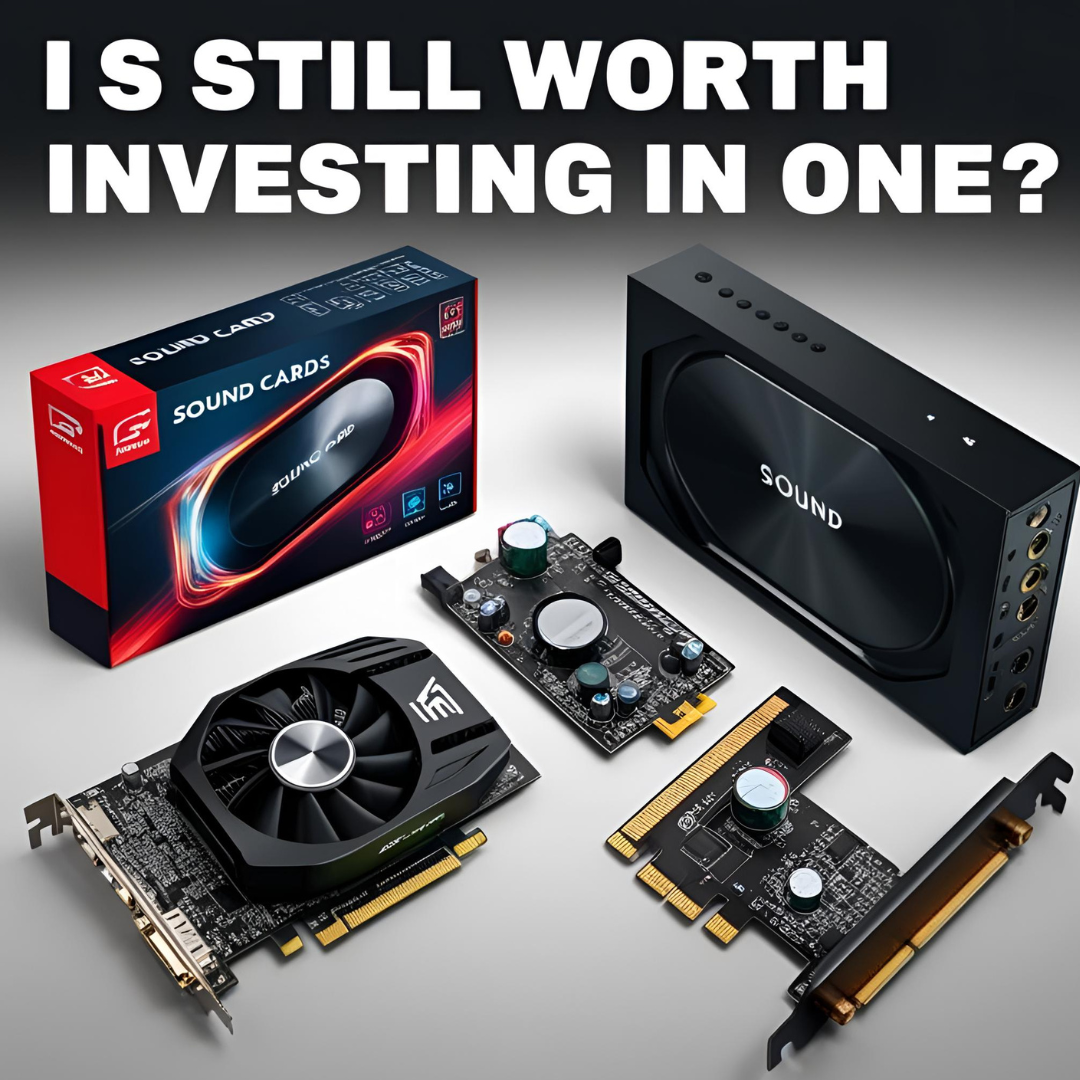In the age of advanced motherboards with integrated audio and powerful USB audio interfaces, the traditional sound card—once a must-have for PC builders and audiophiles—faces the question: Is it still worth investing in a dedicated sound card?
In this article, we’ll explore the evolution of sound technology, what modern motherboards offer, and the scenarios where a dedicated sound card can truly make a difference.
What Is a Sound Card?
A sound card, also called an audio card, is a hardware component that processes audio signals and converts them between analog and digital formats. Traditionally, sound cards were essential for:
- Delivering better audio quality than early integrated audio chips
- Offering more input/output options for microphones, headphones, and speakers
- Enabling advanced audio features for music production, gaming, and multimedia
In the past, sound cards from brands like Creative Labs (Sound Blaster) were standard for anyone wanting superior sound quality.
The Rise of Integrated Audio
Today, nearly all motherboards come with integrated audio chips that provide:
- Multiple audio jacks (headphones, line-in, line-out, mic, surround sound)
- Decent 5.1 or 7.1 surround sound support
- Digital outputs like S/PDIF
- Software audio enhancement suites
Modern integrated audio solutions have improved tremendously in terms of sound clarity, dynamic range, and noise reduction. For many users, onboard audio is “good enough” for casual listening, gaming, and multimedia.
When Does a Dedicated Sound Card Still Matter?
Despite advances in onboard audio, there are specific cases where a dedicated sound card can still provide significant advantages.
1. Audiophile-Level Sound Quality
If you’re serious about high-fidelity audio, a quality sound card paired with premium headphones or speakers can deliver:
- Superior signal-to-noise ratios (SNR)
- Cleaner audio with less interference
- Enhanced digital-to-analog conversion (DAC)
- Support for high-resolution audio formats
Audiophiles and professionals often prefer sound cards with built-in DACs that outperform onboard chips.
2. Professional Audio Production
Sound cards designed for studio use often include:
- Multiple inputs and outputs (XLR, TRS, MIDI)
- Low latency for real-time audio monitoring
- Hardware-based audio processing
- Compatibility with digital audio workstations (DAWs)
For musicians, podcasters, and sound engineers, investing in a sound card or external audio interface is still essential.
3. Gaming with Positional Audio
Some dedicated sound cards offer advanced gaming audio features such as:
- Hardware acceleration for 3D positional audio
- Surround sound virtualization
- Customizable audio profiles for competitive advantage
Gamers looking for precise audio cues (footsteps, gunfire direction) might benefit from specific gaming sound cards.
4. Connectivity and Expansion
Dedicated sound cards often provide:
- More and better-quality audio ports
- Support for professional-grade microphones and instruments
- Optical or coaxial digital outputs for home theater setups
- Compatibility with specialized headphones requiring higher power
This flexibility makes sound cards valuable for users with complex or high-end audio setups.
Alternatives to Dedicated Sound Cards
USB Audio Interfaces
USB external sound cards or DAC/AMP combos have grown popular because:
- They are portable and plug-and-play
- Offer excellent sound quality
- Avoid internal PC interference
- Often come with built-in headphone amplifiers
For many users, USB audio interfaces provide a better return on investment than internal PCIe sound cards.
Motherboard Audio Enhancements
Many motherboards now feature:
- Shielded audio circuits to reduce interference
- High-end capacitors and amplifiers
- Dedicated DACs for better audio fidelity
- Software suites with customizable EQs and sound effects
For casual to moderate users, this can eliminate the need for a separate sound card.
Factors to Consider Before Buying a Sound Card
- Your Use Case: Casual listening vs. professional production vs. gaming.
- Audio Equipment: Are your headphones or speakers capable of revealing the difference?
- Budget: Sound cards range widely from affordable to premium prices.
- Compatibility: Ensure drivers and software support your OS and applications.
- Form Factor: Desktop PCIe cards vs. external USB units.
Pros and Cons of Investing in a Sound Card
| Pros | Cons |
|---|---|
| Superior audio quality for enthusiasts | Can be expensive |
| More input/output options | Takes up a PCIe slot inside PC |
| Enhanced features for gaming and production | Software setup can be complex |
| Reduced electrical interference | Benefits may be subtle for average users |
Conclusion: Is It Still Worth It?
For most users today, the onboard audio solution on modern motherboards is sufficient and convenient. Casual gamers, office workers, and general multimedia consumers rarely need a dedicated sound card.
However, if you are an audiophile, professional content creator, or a competitive gamer looking for every advantage, a dedicated sound card or high-quality external USB audio interface is definitely worth the investment. The improved audio fidelity, specialized features, and better connectivity options can significantly enhance your listening experience and productivity.
Ultimately, the decision depends on your personal needs, budget, and audio equipment. Test your current setup first, and if you crave better sound quality or professional capabilities, a dedicated sound card remains a valuable upgrade.

